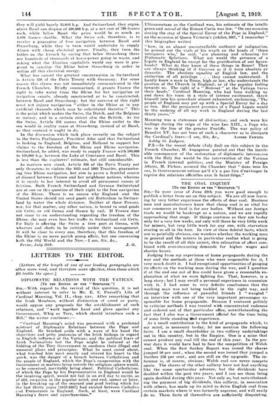LETTERS TO THE EDITOR.
[Letters of the length of one of our leading paragraphs are often more read, and therefore more effective, than those which fill treble the space.]
DIPLOMATIC RELATIONS WITH THE VATICAN. [To THE EDITOP. OP THE " SPECTATOR."] SIR,—With regard to the revival of this question, it is not without interest to refer to Mr. E. S. Purcell's Life of Cardinal Manning, Vol. II., chap. xxv. After remarking that the Irish Members, without distinction of creed or party, would oppose any proposals for the establishment of such relations, and "work together hand and glove against any Government, Whig or Tory, which should introduce such a Bill," the writer continues :- " Cardinal Manning's mind was possessed with a profound mistrust of Diplomatic Relations between the Pope and England. He brushed aside with a wave of his hand the objections and petty jealousies of the Irish bishops in regard to English influence at the Vatican; and the political fears of Irish Nationalists lest the Pope might be induced at the bidding of the Tory Government to condemn their illegal and unmoral plans and principles. What he most cared about, what touched him most nearly and stirred his heart to the quick, was the danger of a breach between Catholicism and the people of England, which the Pope's co-operation with the Government in matters lying outside the religious sphere would, as he conceived, inevitably bring about. Political Catholicism. of which the Pope by his Representative in England would be the inspiring spirit, would not fail in an evil day to excite, as of old, suspicion in the popular mind, and end, sooner or later, in the breaking up of the concord and good feeling which for the last thirty years [1857-1887] had existed between Catholics end Protestants in England. Such, at least, were Cardinal Manning's fears and apprehensions." _Ultramontane as the Cardinal was, his estimate of the intelli- gence and moral of the Roman Curia was low. " On one occasion during the stay of the Special Envoy of the Pope in England," on the occasion of Queen Victoria's jubilee, 1887, " I remember (his biographer writes)
"how, in an almost uncontrollable outburst of indignation, he poured out the vials of his wrath on the heads of those intriguers who,' he said, 'are planning and scheming for Diplomatic Relations. What use would the presence of a Legate in England be except for the gratification of bur figure- heads? What do they know of these things in Rome? They are always thinking of it Coverno as if it were absolute or dynastic. The absolute equality of English law, and the extinction of all privilege . . . they cannot understand. I hardly know a man in Rome, high or low, who understands the position of the Church in England; or of the popular feeling towards us. The sight of a " Redcoat " at the Vatican turns their heads.' Cardinal Manning, who had been walking up and down his room in a state of intense excitement, threw himself into his arm-chair almost exhausted, exclaiming, 'The people of England may put up with a Special Envoy for a day or two. But the permanent presence of a Papal Legate would be the undoing of all my work in England during the last thirty years.'" Manning was a statesman of distinction; and such were his feelings during the reign of the wise Leo XIII., a Pope who was in the line of the greater Pontiffs. The war policy of Benedict XV. has not been of such a character as to dissipate P.S.—In the recent debate (July 2nd) on this subject in the French Chamber, M. Augagneur pointed out that the inevit- able consequence of the restoration of diplomatic intercourse with the Holy See would be the intervention of the Vatican in French internal politics; and the Minister of Foreign Affairs, M. Pichon. assured the Chamber that " clans tons les efts, le Gouvernement estime qu'il n'y a pas lieu d'envisager la reprise des relations officielles avec le Saint-Siege."


































 Previous page
Previous page